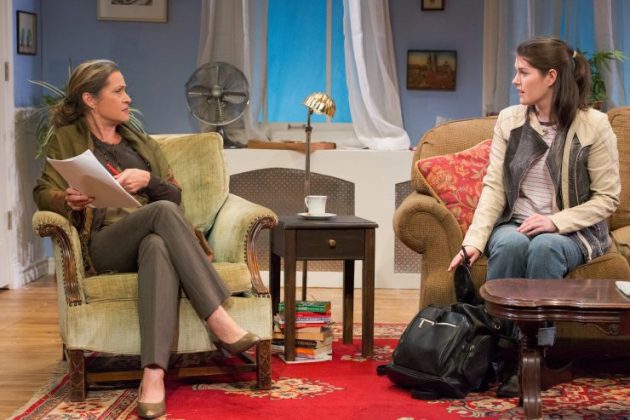
Collected Stories by Donald Margulies, Jessica Bedford directed. Through November 18, 2018, at Act II Playhouse, 56 E. Butler Avenue, Ambler, PA
Donald Margulies’s play, Collected Stories, fascinated me when I first saw it in 1997. It still holds up today as a dramatic presentation of ethical choices.
Ruth Steiner (played here by Susan Riley Stevens) is a respected university professor who earlier had some fame as an author of short stories. She schedules a tutorial meeting in her home with one of her students, Lisa Morrison (Sarah Paton) who appears as immature, ditsy, and overwhelmingly adoring. But Ruth sees talent in Lisa’s writing and takes her under wing.
Gradually, too, she begins to think of Lisa as the daughter she never had.
When Ruth moved from Detroit to New York many years before, she had an affair with the real, nightmarish poet Delmore Schwartz and she tells Lisa all about it. “This was my shining moment,” says Ruth. (Schwartz died in 1966, an alcoholic and a recluse.) Lisa uses this story as the plot of her own supposedly-autobiographical novel. That plot development mirrors the real-life scandal when the young writer David Leavitt appropriated a story by the English poet Stephen Spender in his (Leavitt’s) 1993 novel While England Sleeps. Spender sued, and Leavitt’s book was withdrawn.
Ruth is furious. She sees Lisa’s book as fraudulent, and Lisa’s action as a betrayal of their friendship. On the other hand, Lisa defends herself by saying that if Ruth was never going to publish that story, then she (Lisa) had not only the right but the obligation to make it public.
The argument is gripping, but Margulies tilts it in Ruth’s favor by making her an appealing character and creating Lisa as a shallow person. One wonders why Ruth ever saw a kinship. We side with Ruth, also, because she has a great monologue and many trenchant, literate asides. Yet we have some sympathy with Lisa because we detect that Ruth’s anger is motivated by jealousy.
Most importantly, the play asks what gives a writer the authority to use other people’s stories. Jessica Bedford’s direction is simple and doesn’t distract from that theme.
The only set is Ruth’s Greenwich Village apartment, executed by Meghan Jones. While it does have bookshelves and a menorah, it looks much too modern for this woman who revels in the past. Ideally it should reflect Ruth’s love for old traditions and the lifestyle of her early days in New York.